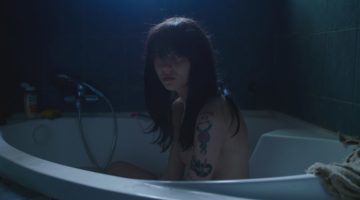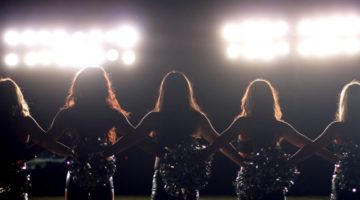Review: Blue is the Warmest Color
Synopsis:
At 15 years of age, Adele’s relatively normal live involves going to school, spending time with friends, and spending time with her family. Her curiosity grows and her mind wanders, though, and a meeting with the blue-haired Emma unleashes uncertain and powerful feelings. Blue follows Adele’s emotionally and sexual growth over the next few years, as her lesbian relationship blossoms and she enters adulthood.
Cast:
Adele Exarchopoulus is young and curious Adele, and Lea Seydoux is the slighty older Emma. We and we get to know both of them very intimately, especially Exarchopoulus, who is in nearly every scene of this epic.
Review:
Winner of this year’s Palme D’or, as well as (perhaps) the title of ‘Most Controversial Film of the Year,’ Blue is the Warmest Color is a lengthy, intimate, and passionate look at the formative years of a young girl’s life. Adèle, all of fifteen years of age, innocently takes in the world around her with a glazed stare and open mouth. Hers is face, and body, and mind too, that we as the audience come to know very personally, and even awkwardly, across three hours chronicling a half dozen years or so.
We meet the Adèle running for the school bus, later paying attention class no more or no less than her peers. She is normal in that she could be any teenage girl; sensitive yet not full self-aware, curious yet confused, obedient, but only to a point. She chews food with her mouth open, passes out in bed limbs akimbo, and is both adored by some and picked on by others.
The first time we sit in on her literature class, they are discussing the notion of love at first sight, and what it means when two strangers match gazes. It’s not the first time that the class serves to foreshadow events; Adèle’s mind is open and easily influenced after all.
It happens to Adèle when she crosses paths with a blue-haired art student, a young woman who ends up in her dreams later that night. Adèle has a doting beau, but her nighttime fantasies are new and pleasurable territory.
The two meet again as Adèle feigns coincidence (as if she just happened upon a lesbian bar), and the two slowly, passionately, excitedly start a relationship. It begins with exploration, the older Emma leading Adèle, it includes some rather lengthy explicit sex scenes, meant to inform their incomparable love and relate their passion.
It is the scene most talked about. Brightly-lit and devoid of sound save for noises of sexual exploration, the two young nudes are viewed close up, giving and receiving in an interminable seems that feels authentic, but clearly divisive (several people walked out of the screening I attended).
Whether or not the scene makes you uncomfortable, it is fitting in the film, sexual without being gratuitous, an openly sexual in a similar fashion that Adèle is later emotionally vulnerable.
Played extraordinarily openly and compellingly by Exarchopoulos, this is entirely Adèle’s movie. Director Abdellatif Kechiche’s often shaky camera follows her ever so closely as she fills the frame, capturing the freckles on her rosy cheeks, her mouth as she chews her food, and the curves of her body, clothed and naked.
We follow her across the years, all in stunning realism, as her life changes in unfamiliar and confrontational ways. Emma and Adèle both have dinner with the other’s parents, and but are in stark contrast. Those meals are the sort of tepid encounters that take place following the romantic, sexual beginnings. Adèle’s relationship becomes harder and both she and Emma grow in their career, make new friends, and question comfort.
The passion that is challenged into sex becomes an emotional tempest; love turns to rage. Her teachers, her family, and her girlfriend all instruct her, but eventually Adèle becomes her own woman. Adèle’s metamorphosis is remarkable to behold, a meteoric rise and the inevitable fall back to Earth.
An astounding film with heart (and skin), the film will spellbound and engage, if not challenge you as well, bringing you into the world of a curious young woman who is utterly enchanting.
Should You See It?
Yes, you should. I can’t say how or with whom, but it’s significant.
[star v=4]





